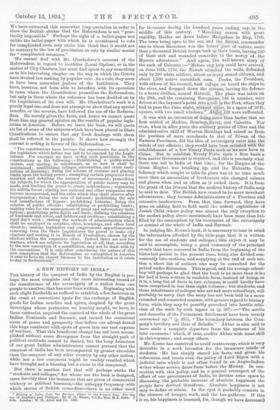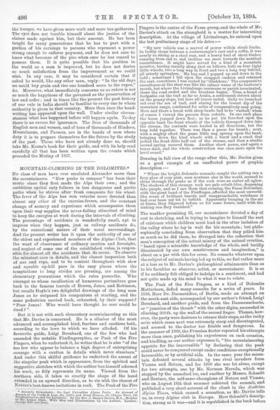A NEW HISTORY OF INDIA.*
THB history of the conquest of India by the English is per- haps the most complete and the most interesting record of the transference of the sovereignty of a nation from one people to another, that has ever been written. Beginning with such slight footholds as sufficed to establish a few factories on the coast at convenient spots for the exchange of English goods for Indian muslins and spices, despised by the great Sovereigns whose protection we humbly sought, we have, in three centuries, acquired the control of the whole of the great Indian Peninsula and Burmah, and turned the occasional oases of peace and prosperity that before our advent dotted this huge continent with spots of green into one vast expanse of verdure. That this beneficent change has not been accom- plished without some divergence from the straight path of political rectitude cannot be denied, but the busy detractors of our great Indian administrators cannot pretend that the conquest of India has been accompanied by greater atrocities than the conquest of any other country by any other nation; while not a few conquests might be readily recalled which have brought not a blessing but a curse to the conquered.
But there is another fact that will perhaps strike the " students and colleges," for whose use the book is designed, more forcibly than the instances that are given of commercial trickery or political baseness,—the unhappy frequency with which stories of British cowardice—there is no other word
• 1/intory of India, from the Earliest 2'itnee to the Present Day. For the use of Students and Colleges. By H. G. Keene, 0.1.E., Hon, M.A. Oxon. 2 vols. London: W. H. Allen and 00. 1898. for it—occur during the hundred years ending, say, in the middle of this century. " Marching across with great rapidity, Haidar sat down before Mangalore in May, 1768. The town being open to the sea, and the Bri.tish commander one to whom discretion was the better part of valour, more than a thousand British troops took to their boats, leaving 240' of their sick and wounded comrades to the mercy of the Mysore adventurer." And again, the well-known story of the sack of Calcutta :—" Before any help could have arrived, on June 16th, 175G, the Nawab attacked the walls, defended only by 250 white soldiers, about as many armed citizens, and about 1,500 native matchlock men. Drake, the President, with others of his council, took refuge on board the ships in the river, and dropped down the stream, leaving the defence to a brave civilian, named Holwell. The place was taken on the 20th, and the remaining Europeans, 146 in number, were driven at the bayonet's point into a cell in the Fort, where they had to pass the June night, without vpter, in a space of 20 ft. square, with two small windows," Ab4,4.120 were suffocated.
It was with no intention of doing more than barter that we first settled at Madras, Bombay,,Sarat, and Calcutta. Nor even, when in after years the military genius of Clive and the administrative skill of Warren Hastings had raised us from the position of mere merchants to that of Diwan of the Eastern Provinces, did the idea of sovereignty enter into the minds of our officials ; they would have been satisfied with the establishment of a few Treaty Ports such as we now have in China. But to establish Treaty Porte upon a firm basis a. firm native Government is required, and this is precisely what there was not in India at that time ; for the Empire of the Great Moghul was breaking up, and the Mahratta Con- federacy which sought to take its place was at no time much more than an association of freebooters who changed colours and places when and as often as it suited them. It is from the grant of the Diwani that the modern history of India may be said to date. The British now ceased to be mere merchant adventurers ; they became Administrators of a Province and extensive landowners. From that time forward, they have gone on adding field to field until the ardent aspirations of Josiah Child (whose policy was almost the only exception to the modest policy above mentioned) have been more than ful- filled by the assumption by his successors of the sovereignty or control of the whole of India and Burmah.
In judging Mr. Keene's book, it is necessary to bear in mind the information afforded by the title-page that it is written for the use of students and colleges; this• object it may be said to accomplish, being a good summary of the principal events that have occurred in India from the beginning of the historical period to the present time, being also divided con- veniently into sections, and supplying at the end of each sec- tion a short list of authors who may be consulted for the period under discussion. This is good, and the average school- boy will perhaps be glad that the book is no more than it is ; for had it been written in readable form, instead of being, as it is, a long list of facts in two volumes, it could hardly have been comprised in less than eight volumes; but students, and those inhabitants of colleges who are not mere schoolboys, will probably be sorry that the story has not been told in a more extended and connected manner, with greater regard to literary form, while they may be possibly provoked into hostile criti- cism of the work by such lapses as (p. 287) :—" The merits and demerits of the Permanent Settlement have been tersely
summoned up ; " (p. 385), " The boundary between the Com- pany's territory and those of Scindia." Akbar is also said to have made a complete departure from the systems of his later successors ! which, if true, credits Akbar with some skill in clairvoyance; and many others.
Mr. Keene has contrived to avoid controversy, which is very desirable in a work intended for the immature minds of students. He has simply stated his facts, and given his references, and treats even the policy of Lord Ripon with a judicial calm which is not often found in an Anglo-Indian writer whose service dates from before the Mutiny. In con- nection with this policy, and in a general retrospect of the effect of our government of India, he devotes some space to discussing the probable increase of absolute happiness the
people have derived therefrom. Absolute happiness is not easy to define or attain. In the ryot it probably consists in the absence of hunger, work, and the tax-gatherer. If this is so, his happiness is lessened, for, though we have decreased the hunger, we have given more work and more tax-gatherers. The ryot does not trouble himself about the justice of the claims made against him, but their amount. He has been taught for many generations that he has to part with a portion of his earnings to persons who represent a power strong enough to enforce payment, and he does not care to know what becomes of the pice when once he has ceased to possess them. It is quite possible that his position in the world as a man is improved, but he does not derive so much satisfaction from the improvement as we could wish. In any case, it may be considered certain that if asked he would, like any other man, reply : "In the old days we could buy grain and rice one hundred seers to the rupee," &c. Moreover, what immediately concerns us as rulers is not so much the happiness of the governed as the preservation of law and order ; and in times like the present the past history of our rule in India should be familiar to every one to whom authority is given in that country. More than once the hand- writing has appeared upon the wall. Under similar circum- stances what has happened before will happen again. To-day there is no excuse for ignorance. The lives of thousands of English men and women, and of tens of thousands of Hindoos, Musstdmans, and Parsees, are in the hands of men whose duty it is to prepare themselves for the future by the study of the past. Those who have not already done so, should take Mr. Keene's book for their guide, and with its help read carefully all that has been written upon the events which preceded the Mutiny of 1857.



















































 Previous page
Previous page